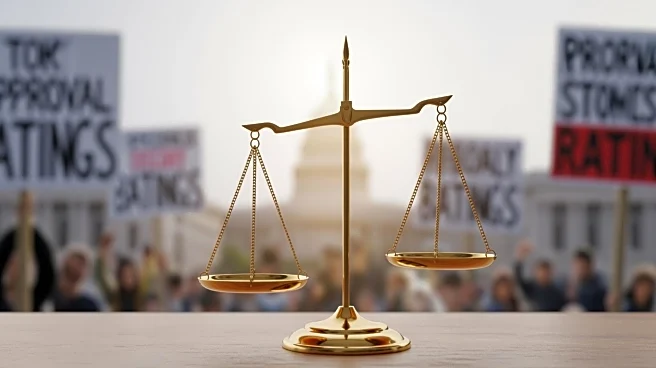What's Happening?
President Trump's approval ratings have shown stability despite the ongoing government shutdown and recent 'No Kings Day' protests. The shutdown, which began on October 1 due to Congress's failure to agree
on funding, has left federal workers and military members concerned about their paychecks. Trump's second term has been marked by unconventional actions, including deploying troops in U.S. cities and imposing tariffs. Various polls indicate mixed approval ratings, with figures ranging from 40% to 49% favorable and 48% to 58% unfavorable. The shutdown and protests have not significantly altered these ratings.
Why It's Important?
The stability in President Trump's approval ratings amidst significant national events like the government shutdown and protests suggests a deeply polarized political climate. The shutdown impacts federal employees and the economy, while protests reflect public dissent against Trump's policies. The consistent approval ratings indicate that Trump's base remains supportive despite controversies. This polarization could influence upcoming elections and legislative negotiations, affecting public policy and governance. Stakeholders such as political leaders and civil society groups may need to address these divisions to foster more effective governance.
What's Next?
As the shutdown continues, pressure mounts on Congress to reach a funding agreement. The impact on federal workers and services could intensify, prompting potential protests and political action. Trump's administration may face increased scrutiny and legal challenges over executive actions. Political leaders might seek compromise to resolve the shutdown, while public opinion could sway future electoral outcomes. The stability in Trump's approval ratings suggests that his base remains firm, but ongoing national issues could influence broader voter sentiment.
Beyond the Headlines
The government shutdown and protests highlight deeper issues in U.S. politics, such as executive power limits and public trust in governance. The shutdown's impact on federal workers raises ethical concerns about government responsibility. Protests reflect cultural and societal divisions, emphasizing the need for dialogue and reconciliation. Long-term shifts in political engagement and activism may arise from these events, influencing future policy and governance approaches.











